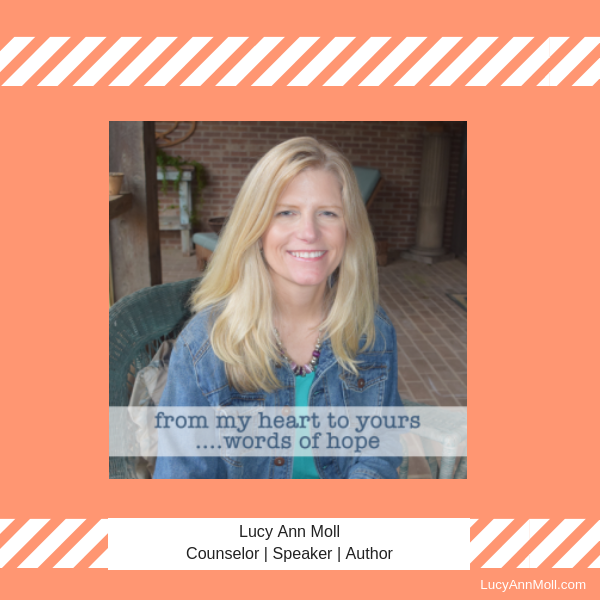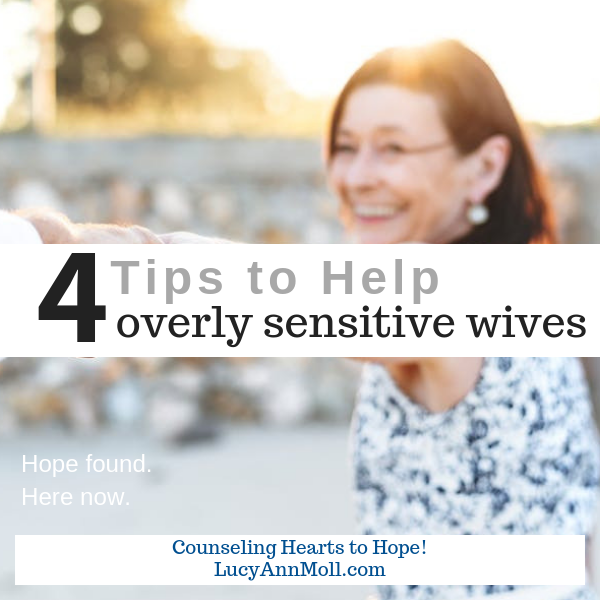
by Lucy | Nov 19, 2018 | biblical counseling, relationships
1. Identify trouble spots.
As you look at the calendar, identify dates and places that may prove painful during the holidays. For me, Christmas Eve is tough because my mom always hosted Christmas dinner at her home, but now she’s gone. So years ago, my husband and I began a new tradition of making Christmas pizza with the kids. It helped us handle the grief.
You may also choose to not attend a certain party, or stay for an abreviated time, or attend with a caring friend who’s aware of your pain and helps you as needed.
I think of a former counselee with an abusive family member whom she needed to avoid. She made sure her close cousin was aware of this trouble spot, and she stayed by her side at a holiday dinner where he’d be present. Identifying this trouble spot and telling her cousin made all the difference.
2. Loss is not the boss!
Yes, the loss of a broken dream or a loved one’s passing may seem impossible to survive. But remember that loss is not the boss. Rather Jesus is Lord over all, including your losses.
Click & Tweet!
Here’s a verse that has helped me and many counselees:
Because of the Lord’s great love we are not consumed, for his compassions never fail. They are new every morning; great is your faithfulness. Lamentations 3:22-23
3. Grieve on purpose.
Yes, grief can come out of the blue when you least expect it. But you can take charge and grieve on purpose on your time. Some ways to do this:
- Journaling
- Listening to music
- Walking in nature
- Have a meaningful conversation with a friend
As you grieve on purpose, you honor the memory of your loved one. You can also begin to dream new dreams that replace the broken one.
4. Recognize that you’re not alone.
No one has it all together. And this includes that woman at church who’s all smilles and pep. (In fact, she may be hiding a hurt.)
One struggles with grief, another with memories of a broken marriage, a wayward child, or a past regret. We each hurt in different ways, right?
But be sure to not go it alone during the holidays. Reach out to a trusted Christian friend or a biblical counselor. Psalm 56:1-4
5. Surround yourself with other believers.
When you hurt, it’s tempting to stay under the covers on Sunday morning and every morning. But you’ll be glad you flung off the blankets and put your feet on the floor.
Consider my counselee Nicole who struggled with loss (a divorce as well as the death of a loved one). When her grief began to pull her into despair, she reached out for counseling, and I listened deep to her story.
She had gotten into a bad habit of lingering in bed and mulling over her problems, leading to more hopelessness. So we put together an action plan including a simple morning routine. Soon she noticed her spirits lift as she followed the action plan. Of course her grief didn’t go away immediately. In fact some of it will probably stick around as she misses her loved one and life as it once was, especially during the holidays.
But now she is living with purpose. She meets with friends, volunteers at a school, participates in a women’s Bible study, and attends church where we believers are called to “bear one another’s burdens.” Having friendships with Christian women has helped greatly in her healing.
Carry one another’s burdens; in this way you will fulfill the law of Christ. Galatians 6:2
What About You?
Are you looking to the holidays joyfully or are they a source of pain? Think of one step you can take to lessen your own grief or that of another. Now plan how you’ll put this step in action and do it. Let me know how it goes. 🙂
Counseling Hearts to Hope,


by Lucy | Nov 7, 2018 | emotions, relationships |
What are the top needs of moms?
A while back, I queried a few hundred moms in a Facebook group, asking their top 3 needs. My imperfect scientific study revealed these three top vote-getters:
1. A support system of family and/or friends
2. Time alone
3. Encouragement
In this short article, let’s focus on #1. Your can read more about time alone and encouragement here and here.
Family: I Need a Mother Too
Are you old enough to remember the 1970’s TV show “The Waltons“? Watching reruns warmed my toes many an afternoon. Ma and Pa would have a problem on the farm, and the family and neighbors would stick together to solve it. The bonded in tough times.
John Boy was kinda cute in a geeky way. Me and Mary Ellen–we could have been best friends. Grandma had a sour personality too, but she cared, really cared. You could tell.
Back then, in my grade school years, I ached for the sense of belonging too. A network of caring people take note of your needs. They help you and pray with you and for your. They listen. And no one does this better than famiy–usually but not always. Read more about overcoming pain caused by family.
Finding Close Friends at Church!
A couple decades ago, when my family moved to a new home in a small city away from family and friends, I put a plan in action.
Join a friendly church and — presto! — embrace a new, big family.
But my plan was a fail! You see, once we settled into our new church, our friendly “friends” quickly turned back to their own tight circles of longtime buddies.
Have you looked to a church or other group as your support system because you lacked family and friends? How did it go for you? Could you be at home at a church where you were close to Jesus yet not so close to the people? Did you reach out too?
Making Mama-Friendly Connections
The women I queried shared a bunch of ideas on creating a support system when family and friends. Here are some.
Friends to Listen
Babysitter!
- One mom had to return to work when her baby was a newborn. “A reliable babysitter who was prompt, a woman who truly loved children and was extremely dependable.”
- Another woman with four small children says she needs “a friggin’ baby sitter during the day so that I can go get things done without kids, or so if one child has an appointment, I don’t have to lug all of them with me.”
- “Before I had my boys, we lived in a neighborhood where the mothers would trade time, watching each others kids, so they could have some time to do something else. Kind of a babysitting co-op. I think for every hour you put in, you got one back.”
A Mentor
- When family is far away, having an older woman helps. Her wisdom, her laughter, her presence. Also mentors for kids!
“One of my top needs or desires while they were younger (and even now) was/is for older mentors or adults to be in their and our lives. They have no grandparents, no uncles, aunties or cousins and at times I would just love someone to encourage and give advice and just be proud of our children like we are.
I can only imagine what it might be like to ring my parents up and say help or come to this show to watch the kids! I guess I’m saying mentors or adopted aunties or uncles would be a dream come true.”
- Shares a mom who husband travels a lot: “My youngest (has) ADHD. A male mentor could have helped him in his social maturity and awkwardness.”
Friends, please share one of your mama needs in comments. Let’s encourage one another.
Counseling Hearts to Hope!


by Lucy | Oct 16, 2018 | relationships
Do you desire gospel-centered friendships? If you’re a Christian, you probably want good friends who love the Lord like you do. Friendship is a gift.
Click & Tweet!
Biblical counselor Shannon Kay McCoy, featured on my Heart2Heart Counselor Directory, shares her stories of friendships. Her article appeared first here on The Biblical Counseling Coalition website and is used with permission. (Edited for length.–LAM)

“Taking a break from our friendship.”
Click & Tweet!
That was the title in the subject line of an email I received from a dear friend. My jaw dropped and my heart sank. It felt weird—like a boyfriend breaking up with me in grade school.
First, she stated how much she appreciated our friendship; then proceeded to explain why she needed to take a break. She expressed her understanding of how busy I was with my daughter, work, etc., but felt that I had been “rude” and “flaky” about planning to spend time together and then cancelling due to other conflicts.
Although I was offended, she was right. At the end of the email, she left open the possibility to continue our friendship “at another time or season in life that is maybe less busy.”
It was clear what she needed from me; however, life got busier and I wasn’t able to give to her what she was asking. I received that email a year ago and my heart still aches over it.
God Made Us for Friendships
Friendships play an important role in our lives. From early childhood, children naturally gravitate toward forming bonds with other children. This tendency continues into the teens years and adulthood.
God created us as relational beings. He put the desire for friendship in our hearts. Just as God instituted marriage in the Garden of Eden with Adam and Eve, He instituted friendship.
However, just as Adam and Eve marred God’s purpose for marriage, the Fall marred God’s purpose for friendship.

A Friend of God
Webster defines friendship as a person attached to another by feelings of affection or personal regard. God’s illustration of friendship goes a lot deeper.
He demonstrated a depth of intimacy when He spoke to Moses “face to face, just as a man speaks to his friend” (Exodus 33:11). God expressed such grace and kindness to Moses on a deeper level than a master to a servant. He entrusted Moses with a greater revelation of Himself. Imagine having a relationship with God like that!
Yet the fact is we do have that kind of friendship with God through Jesus Christ:
No longer do I call you slaves, for the slave does not know what his master is doing; but I have called you friends, for all things that I have heard from My Father I have made known to you (John 15:15).
Jesus Christ’s death and resurrection has given believers extraordinary access to the heart of God making us His friend for whom Christ laid down His life (John 15:13). Everything we have in Him, He wants us to give to others.
This type of friendship is gospel-centered. Our relationship with Jesus Christ is the bedrock on which gospel-centered friendships are based. The gospel is the power of God that transforms our earthly friendships. It frees us to be the kind of friend people need.
Characteristics of Gospel-Centered Friendships
Christ-centered
Gospel-centered friendships are centered on Christ. They are chosen by God. Here’s a story of a Christ-centered friendship.
1. A story of meeting — and missing.
Jan was a new employee. When I first saw her, I was immediately drawn to her. I knew I had to meet her.
A few weeks later, I approached her to introduce myself. Right away we became instant friends. To my delight, she was a Christian.
We both had great love and affection for Jesus Christ. We also encouraged each other in Christ, enjoyed discussing Scripture, and spoke from a Christian worldview. Our friendship grew based on that common ground.
And so we became kindred spirits and prayer partners. We took our workplace frustrations and walked the parking lot in prayer. We also experienced God’s great power in answer to our prayers.
Everyone at work knew we had a special friendship so that when she announced that she was moving, my coworkers approached me with sympathy. Now we only communicate occasionally. God had a purpose for our friendship for a season.
Although we don’t talk everyday like we used to, she is my gospel-centered friend for eternity.
Redemptive
Gospel-centered friendships are redemptive. Here’s a story of restoration after betrayal.
2. A story of betrayal and healing.
Linda and Nancy had a friendship that was thirty-years deep—until Nancy’s betrayal.
Linda was unable to attend the women’s Bible study for several weeks due to personal painful circumstances. Then she found out that Nancy told several women in the Bible study about her situation. So she dropped out of the Bible study and avoided Nancy at church.
They didn’t speak for two years. Linda heard from a mutual friend that Nancy was battling cancer. Linda’s heart was broken for her friend. God used Ephesians 4:32 to convict Linda’s heart—
Be kind to one another, tender-hearted, forgiving each other, just as God in Christ also has forgiven you.
Linda laid aside her resentment and chose to forgive Nancy. God restored their friendship.
Sacrificial
Gospel-centered friendships are sacrificial. They are an investment of the heart. Here’s a story of sacrificial friendship.
3. A story of friendship during a difficult divorce.
After my husband left our marriage, I went through a three-year depression. Somewhere in the midst of that depression, I was talking to my dear friend on the phone who lived an hour away. I can still picture it.
There I was sitting on my bedroom floor sifting through a pile of bills and paperwork. I have no idea what I said or sounded like, but my friend told me that she was driving down to take my little daughter to the mall so that I can have some time to myself. (I think she felt sorry for my daughter being cooped up with a sad mommy!)
God used that time alone with me to get my attention. Through many tears and wrestling with God, a decision was made in my heart to release the pain and embrace Him.
I began to come out of my depression. Thanks to my friend’s sacrificial love and investment in our friendship, I was able to connect with God again. Indeed, she is truly a friend that loves at all times (Proverbs 17:17).
Join the Conversation
So what type of friendships are you cultivating? Do you drive your friends to God or to yourself? How has this blog topic changed your view of friendships?
Counseling Hearts to Hope,


by Lucy | Oct 9, 2018 | biblical counseling, emotions, relationships |
HELP & HOPE for overly sensitive wives! Has your husband claimed you’re overly sensitive? Maybe you are overly sensitive. Maybe you aren’t.
Scroll to the 4 tips below.
This article by biblical counselor Andrea Lee appeared first here at The Biblical Counseling Coalition website and used with permission.

Touchy. Moody. Easily offended. Has your husband ever said this about you?
Click & Tweet!
Does he walk on eggshells around you or fear you will misinterpret his comments? Are you overly sensitive to his assessment of your performance or character?
To define my terms, an “overly sensitive wife” is excessively hurt by the delivery and content of her husband’s comments.
Her emotional frailty makes playfulness in the marriage rare. Furthermore, she overreacts to any reproof, making it hard for her husband to help her grow. Instead of overlooking a poorly timed comment or opinion with love, she is devastated. She is allergic to criticism and assumes her husband is trying to hurt her.
Let me be clear.
There are times when you as a wife must address issues of biblical obedience or conscience with your husband.
You should confront your husband if he maliciously uses humor, constantly criticizes, or is regularly harsh and irritable. Such provocation is ungodly and if this is a pattern, discuss this with him, and if needed, seek help from your pastor or a biblical counselor.
But often believing husbands are not being malicious. Nonetheless, you might find yourself provoked, offended, and hurt. Even though your husband could grow in his ability to gently reprove you, you know you’re part of the problem.
Such emotionally disproportionate responses never lead to peace. As you examine the ways you contribute to low-grade conflict in your marriage, pay attention to the following four areas.

1. Realize the connection between desires and interpretations
Our values and desires shape how we interpret our experiences. In other words, the things we desire, cherish, and love more than God influence the way we make sense of conversations and circumstances.
For example, because a wife wants to be perfect in an area (mothering, housekeeping, decorating, fashion, cooking, poise, entertaining, etc.), she might overreact when her husband mentions a weakness. The problem isn’t that her husband is wrong or spiteful, but rather she has assigned too much value to this area.
2. Recognize the link between idolatry and pride
When our desires are frustrated, we can respond with unreasonable hurt and irritation. This is idolatry. Idolatry is looking to, clinging to, and trusting in something other than God in order to achieve a desired experience or outcome (Is. 44:17; Hab. 2:18; Col. 3:5).
We either want what God says is wrong, or we want a good thing too much. Foundationally, idolatry serves self. We use things or people to exalt us or to give us pleasure, comfort, control, and approval.
Overly sensitive wives seek fulfillment in their achievement or performance. We are willing to pout, cry, or withdraw when our husbands minimize our efforts. This happens because we’ve merged performance with identity: “If I don’t perform perfectly, then I’m not worth anything.” This may sound like humility, but it’s really pride.
What are some signs that pride may be at work in your life? Stuart Scott pinpoints several markers of pride that fuel oversensitivity. These markers include being …
- devastated or angered by criticism
- focused on self and wanting self to be elevated
- consumed with what others think
- defensive
- convinced that you have little sin and others are more sinful
- disheartened because you are not perfect and have weaknesses.
3. Repent of specific manifestations of idolatrous pride
So what are some desires that create conflict in this area?
Perfectionism
An overly sensitive wife focuses on areas where she wants to be the best. She wants her performance to merit approval from others. And when it doesn’t, she is devastated and reacts with quiet hurt or loud defensiveness.
Fear of Man
Perfectionism and fear of man go hand-in-hand.
The hypersensitive wife wants to be perfect so that others will praise her and have no ground for judging her. When she focuses on her husband’s evaluations and stops worshiping God, her performance takes center stage.
It devastates her when she fails to meet her own standards. Instead of repenting of pride and the way she exalts herself, she lashes out at the one who draws attention to her “failure.”
Control
We all use control as a strategy to get what we want.
And the overly sensitive wife believes she knows best and if everyone would do things her way, life would work at optimal speed and enjoyment. She is quick to defend her motives and ignore her sin. She wants to be seen as blameless in all ways and is unaware that her motives are mixed. And she underestimates how sinful she is and is easily hurt when her husband questions her motives.
Use these descriptions to evaluate the way pride impacts your interactions with your husband. This will help you repent more thoroughly and change more deeply.
4. Respond with worship and love
Our God of all grace (1 Pet. 5:10) can help you to lay aside destructive sensitivity and to put on humble love for Christ and others. Turn to him.
- Ask God for grace and wisdom to repent of wanting your husband to regard you as perfect and worthy of constant praise.
- Pray God will help you to cherish Christ’s perfection and put away attempts to establish your own righteousness.
- Thank God He empowers your love and service (1 Pet. 4:11) and causes you to grow (1 Pet. 5:10; 1 Thess. 5:23-24).
- Choose to believe the best about your husband. Assume he has good motives unless he confesses otherwise (1 Cor. 13:4-8; cf. 1 Cor. 4:5)
- Focus on loving your husband and praying for him rather than on being loved perfectly by him (Phil. 2:3). Only Christ will love you perfectly.
What fuels your over-sensitivity?
1 Stuart Scott, From Pride to Humility (Bemidji, MN: Focus Publishing, 2002), 6-10. 2 For more on the ways sin is natural, see Ed Welch, Crossroads: A Step-by-Step Guide away from Addiction, Facilitator’s Guide (Greensboro: New Growth Press, 2008), 31.
Want Help?
It’s miserable to be overly sensitive, right? You’re often anxious, afraid, and just plain sad. May I suggest that you consider getting help from a trusted Christian friend, a pastor, or a biblical counselor?
A great resource is Heart2Heart Counselor Directory! See it here. Look over the personal profile pages of experienced and vetted female biblical counselors, listed by location and speciality. Nearly all Heart2Heart counselors also counsel by Skype/Facetime too.
Counseling Hearts to Hope,


by Lucy | Oct 2, 2018 | biblical counseling, emotions, relationships
Truly embracing God’s love for you — especially if you’ve experienced the horror of sexual abuse — is the way to hope and healing. Do you want healing too? Read Monica’s story and learn how gospel-centered counseling helped remove stumbling blocks to her faith. Consider biblical counseling for you or a loved one too.
This article by biblical counselor Shannon Kay McCoy, featured on Heart2Heart Counselor Directory here, appeared first at the Biblical Counseling Coalition website and is used with permisison.

Monica’s Story
At a young age, Monica was sexually abused by her step-father until he divorced her mother. In her teenage years she was raped by her brother’s friends.
She lived a life of promiscuity—getting pregnant twice with both ending in abortions. She was drinking alcohol heavily and using drugs until the age of 24 when she developed cervical cancer. God used her illness to get her attention.
Click & Tweet!
She became a Christian and met her husband, Jeff, at church. Only one year into the marriage, Monica began suffering from bouts of depression and self-loathing.
She was distancing herself from her husband but didn’t know why. You see, she thought as a Christian, she shouldn’t struggle with these issues. Finally she confided in a Christian friend who encouraged her to seek biblical counseling.
The Journey Begins
The counseling process helped Monica to discover some stumbling blocks to her faith. She had doubts about God—about His goodness, His grace, His love, and doubted ever being free from condemning thoughts. With the love and support of her husband, she began the difficult process of looking at her past through the lens of Scripture.
She was afraid to r eveal certain details to Jeff because she didn’t want him to stop loving her. He assured her of his love and commitment, so she forged ahead allowing God to peel away layer after layer into her past.
eveal certain details to Jeff because she didn’t want him to stop loving her. He assured her of his love and commitment, so she forged ahead allowing God to peel away layer after layer into her past.
During the most difficult layers of dealing with the sexual abuse, she had to distance herself from him intimately. After eighteen months of biblical processing, Monica was able to restore her relationship to her husband.
Believing Again in God’s Love
Through the counseling process, her faith had grown stronger. She believed in God’s goodness and grace. But she wasn’t so sure about His love.
She told the counselor that she still couldn’t understand how a holy God could love someone with her past. The counselor asked her,
How do you know that Jeff loves you, even after knowing of your past?
She thought about how Jeff had been very supportive throughout the counseling process. He had been incredibly gracious to her when she was at her worst with depression and self-loathing. During the time she separated herself from him intimately, he was amazingly patient and forgiving.
He wasn’t shocked nor disgusted when he learned of the sexual abuse. Instead, he was a safe and secure haven.
Her husband’s love encouraged her to share her heart with him. Knowing her ugly past, she was only met with Jeff’s unconditional love. In return, she loved him in a much deeper way. She would sacrifice her time and energy to please him.
And spending time with him was no longer a burden. She treasured every moment with him because she felt valued by his love.
Reclaiming Her Love for Her Husband
Monica kept growing in her relationship with God and her husband. Indeed, she no longer feared her husband’s love.
Click & Tweet!
To the question, “How do you know that Jeff loves you?” she answered this way. “I know Jeff loves me because he has demonstrated his love in marvelous ways.” The counselor asked Monica to read Romans 5:8, which states,
But God shows his love for us in that while we were still sinners, Christ died for us.
The counselor stated that God proved His love for her by sending His Son, Jesus, to die for her sins. And since she is a believer, there is no condemnation for those who are in Christ Jesus (Romans 8:1).
The counselor also reminded Monica that God’s love was lavished on her through Jeff’s love. Seeing how Jeff loved her with the love of God, she began to get the picture. She finally grasped a greater understanding of God’s love.
Monica also learned that God’s love for her is incredibly gracious and sacrificial, amazingly patient and forgiving, safe and secure, and completely accepting of her in spite of her past. She realized that Christ has given her a new identity—His identity. She was no longer a victim living in her past.
Click & Tweet!
God saw everything she did and yet still loved her. This realization gripped Monica deep into the core of her soul.
Motivated by Love to Love
God’s love granted Monica the grace to love Him. As she daily contemplated His love, she became more sensitive to affronting the One she loved which led quickly to repentance of sin. She also found it easier to pray. And she didn’t fear seeking His presence.
In addition, she wanted to spend time with God. She desired to please Him with her time and energy. She had a growing willingness to sacrifice her life for God’s glory—no longer doing things her way.
Monica learned as the Apostle Paul did, that “the love of Christ controls us” (2 Corinthians 5:14). Christ’s sacrificial, substitutionary death motivated Paul’s service for Him. In Galatians 2:20, Paul states,
I have been crucified with Christ. It is no longer I who live, but Christ who lives in me. And the life I now live in the flesh I live by faith in the Son of God, who loved me and gave himself for me.
Paul learned that he died to the Law because he was crucified with Christ. Therefore he was able to live for God because Christ lived in him.
The greatest love of all.
True love has a constraining virtue. Monica realized this in Jeff’s love for her. It cost him something to love her. He accepted the consequences of her past and chose to love her. She would do anything for him because he loved her at her worst.
Even greater is the love of Christ. It cost Him something to love us. He gave up His life when we were at our worst—and still loves us at our worst. By faith Monica embraced God’s love for her. In return, she loved God because He first loved her (1 John 4:19).

Join the Conversation
Think of a time when you felt really loved by someone. What effect did it have on you? How did you respond to that love? Now think of God’s love for you. What effect does His love have on you? How do you respond to His love?
Counseling Hearts to Hope,


by Lucy | Sep 11, 2018 | biblical counseling, biblical counseling, relationships
Welcome to “How to Talk Like Jesus!” This 2-part series helps you communicate the truth in love with family, friends, and neighbors who “make” you want to scream or run like Forrest Gump. In case you want to see the first post in this series, click here.
 In the first post in the series, you found out 2 reasons why godly communication is important to successful living: 1) to please God above all and 2) to be humble. The next 4 are listening well, well chosen words, nonverbals, and invest time to talk.
In the first post in the series, you found out 2 reasons why godly communication is important to successful living: 1) to please God above all and 2) to be humble. The next 4 are listening well, well chosen words, nonverbals, and invest time to talk.
1. Listening Well
Listening well isn’t as easy as it sounds. It is more than hearing.
Haven’t you talked with a teen who looks at you and seems to listen but you just know he isn’t paying attention? How do you know whether he’s listened well? Try checking in with him by asking a super simple question: Could you tell me what I just said?
Here are 3 more essentials:
- Not interrupting.
- Paying close attention to what the other person is saying.
- Refrain from planning your response while the other person is talking.
He who gives an answer before he hears, it is folly and shame to him. Proverbs 18:13, NASB
Also, ask gentle questions to make sure you heard right!
A couple of examples:
“So what you’re saying is ____.” Fill in the blank with a short summary of what the speaker said.
“Could you explain a little more?”
Make it practical: In your next conversation, decide to not interrupt.
2. Use Well-Chosen Words
Careless words are worthless. Instead, choose your words well. Then improved communication helps with relationships at home, in the workplace, and at church.
But I tell you that every careless word that people speak, they shall give an accounting for it in the day of judgment. Matthew 12:36, NASB
The best chosen words build up, encourage, and show you care. Recall a time that someone encouraged you. What encouraging words did you hear? How did their encouragement help you?
Make it practical: Select a person to build up with your words today.
3. Watch Your NonVerbals!
Crazy but true, at least 75 percent of your communication is your tone of voice and body language, not your actual words. One study puts is at 93 percent!
The phrase “Please bring me a glass of water” could communicate kindness or anger, depending on whether your face is relaxed or scrunchy and your arms are crossed or your tapping your foot or raising your voice.
When you notice that someone’s words and nonverbals do not match up, ask a followup question or make an observation. For instance, when your son says, “Mom, I cleaned my room, just like you asked,” but his voice sounds strangled and you see a sneer, you’ll probably wonder whether he’s lying or has a bad attitude.
Nonverbals to watch:
- Tone of voice
- Volume of voice
- Hand gestures
- Body posture
- Facial expressions
Make it practical: Ask a close friend or family member to watch your nonverbals for a few hours or a day and jot them down and share them with you. As you review the list, choose one or two to change.
4. Take the Time to Communicate
Says biblical counselor and author Stuart Scott, who wrote The Exemplary Husband:
“We need to talk when we don’t want to and listen when we don’t want to. . . .Just because we are ill, tired, or not much or a talker, we are not released from the responsibility to work at good communication.”
Make it practical: Name one way you can communicate better even when you’re busy.
A Resource for You
Everyone needs someone to talk to. Would you like a complimentary counseling session to share what’s on your heart? Please leave a brief message here. Confidential. Learn more about my heart for women, marriages, and families who hurt here.
Counseling hearts to hope,













